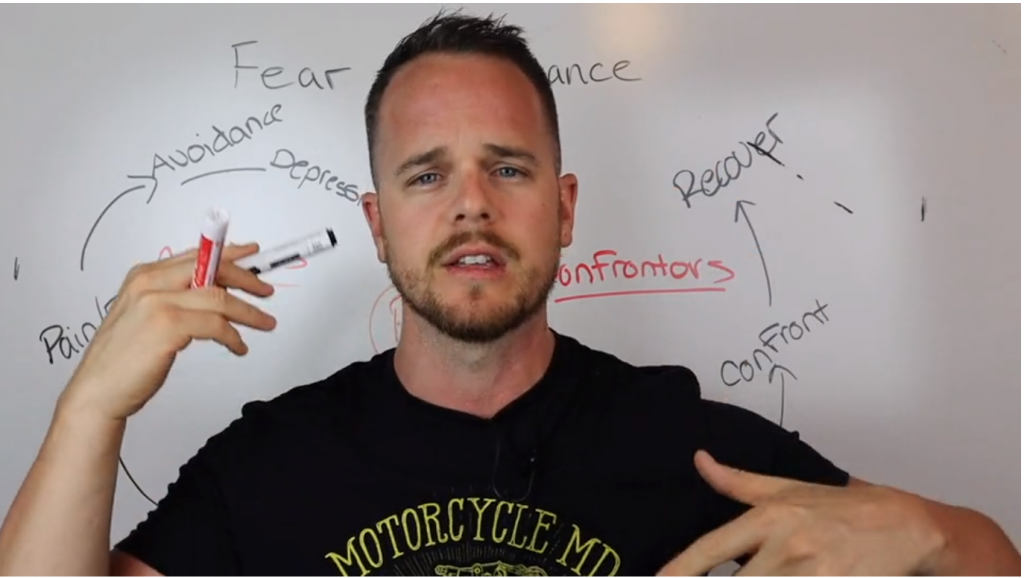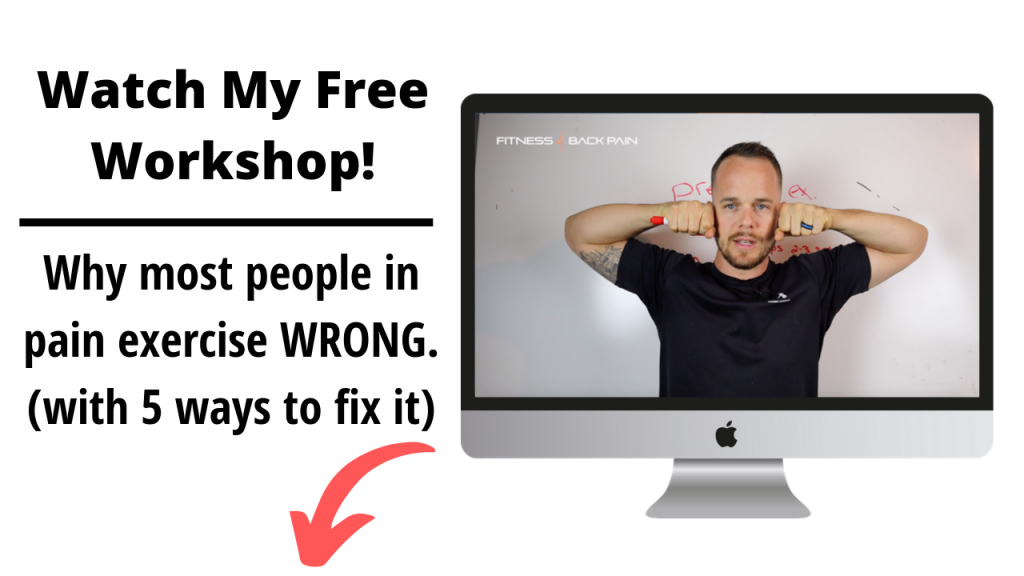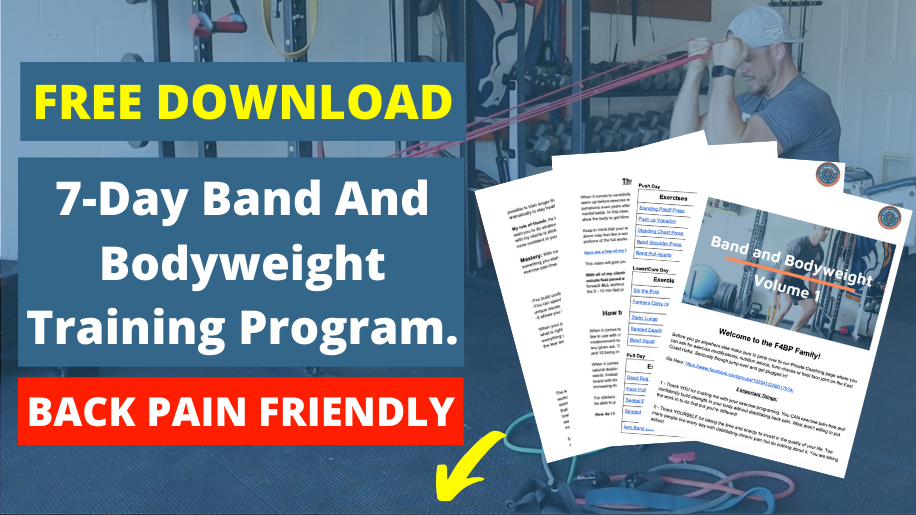All right, guys, welcome back to another episode of “Coffee and Coaching.”
In today’s post we are diving into the topic of whether or not seeing a chiropractor for back pain relief is beneficial. This question came in from a reader who has been seeing a chiropractor without any tangible success. Trust me when I say, I can totally relate to this!
If you want to check out the video version of this article you can check it out here!
So, there are three aspects of getting serviced, or getting worked on by a chiropractor that is really important to consider before you seal the deal with whoever you plan to work with. Think of these things like a must-have To-Do List for your provider.
Really, when it comes to answering the question, is chiropractic services, or is a chiropractor useful to low back pain or any kind of body pain, it really just depends, and if you watch this video all the way through, I’m going to make sense of saying why it just depends.
There’s a lot of aspects to back pain that you can’t just be put into a box and given to you. You undo the box and you do what’s inside the box and your back pain’s gone. It’s not like that. There’s a lot more involved with back pain.
So, to say, is chiropractic care good or bad, just like that, it’s actually really hard, but I’m going to give you some information here that’s going to allow you to think differently and apply whether you’re going to continue with your chiropractor or start your search for a new one.
Let’s jump into the top things to ask yourself before you sign the treatment contract!
Are you going to see your Chiropractor just for the adjustment?

So, the first point I want to talk about is the adjustment factor. Just looking at the body and saying, you know what? You’re out of place, and I believe that if you are properly adjusted over a proper amount of time that you will feel better, your back pain, middle back pain, upper back pain, cervical pain, will go away completely is NOT an accurate statement.
That’s the first thing you have to look at if you’re going at it from an adjustment standpoint. If you believe that in order for you to feel less pain or have more control over your pain, or to be pain-free, I have to be adjusted, and be perfectly aligned. If this is the way you’re thinking, it’s a bad way of going into being worked or being seen by a chiropractor because it’s not the truth.
You don’t have to be perfectly aligned to be in control of your pain.
Yes, control is hard to find, and it feels like you are helpless when it comes to being deep, deep in the waters of chronic pain, but if you’re basing your treatment off of adjustments alone, it’s time for a shift in thinking. I’ll share a brief story of my own situation.
I’ve seen multiple chiropractors, I’ve spent thousands of dollars on seeing chiros, and I’ve never really been able to see any progress at all even partially through any program that I have been on.
Their contracts were always super long, and it was always something that I just couldn’t afford to see all the way through. The thing about it was that I never saw relief. If anything, I actually got worse. The chiropractors that I saw, focused solely on adjusting. One of them, my last one that I saw, was actually a sports chiropractor, and he added in Graston, which is like a myofascial scraping with tools, and A.R.T, (skip to 5:45) which is basically a form of tissue work. I had a few sessions using those “extracurricular” treatments, but unfortunately, if you saw the amount of work he did outside of adjusting, you’d be amazed, because he didn’t spend much time at all. Every time I questioned it, the only thing he could really say is you have to just stick it out. And I went through that multiple times with multiple different chiropractors, all getting the same results.
No freedom, no progress, and no hope in a future of actually seeing chiropractic care, or adjustments solely actually working for me.
Does your Chiropractor address Strength and Movement Correction?

The second area I want you to focus on when it comes to whether or not chiropractors are better for back pain or not in deciding whether they have a lack of strength training and correction within their actual program. The chiropractor that I went to actually would have you come into a single room by yourself, do the adjustments spend 10-12 minutes on the Graston and ART and send you on your way. And that’s the second major point that I want to make here is, if you’re walking into a chiropractor office and you go down a hallway and all he has is rooms all the way down, with no training equipment, stability balls, bands, dumbbells, barbells or squat racks, or things that involve strengthening the body, then me, personally, I would suggest that you find a different chiropractor.
And this is why: a lot of times when it comes to being misaligned or feeling like your body’s just not in tune, a lot of it comes down to combining educating the person on what may be wrong, what could be causing the issue, learning to strengthen, balance and fix these issues, in their body, from a strength training standpoint.
Too often, your chiropractor will focus so much on the adjustment and sticking to the adjustment process, and never introducing a lot of strength training or exercises that will help you maintain an alignment.
Now, I’m not here to argue that adjustments are 100% stupid, or having good posture and position is not going to be beneficial for you. But if you are all out of whack and you’re using your chiro to put you back into place, how are you going to stay there? ‘Cause you still have to go to work. You have to drive your car, sit in traffic or at work all day, it’s what we call life. So, if you’re not strengthening, rebuilding stamina and endurance in these muscle tissues to allow this alignment that you’re getting done to stick you’re not going to see much change.
**NOTE**
If you’re looking for monthly exercise programs that are safe for sensitive backs and step by step information that will give you more confidence in your spine and control over your chronic pain, check out the F4BP Membership.
Is Your Chiropractor Educating you on Pain and What Pain is?

This kind of segues into the third major point, how much time does this person spend educating you on what pain really is? There is a massive, massive pain revolution going on in the medical industry coming out of Australia, and a lot of that knowledge has been going on for years, like five, ten, fifteen years, but it’s trickling more into the medical practices here in the US. And they talk heavily about pain education, educating patients who are in pain or chronic pain, about what pain actually is, and how the biopsychosocial model should be a staple in your recovery.
If you do not have some aspect of learning where pain comes from, how we experience pain, and what it actually means, you’re not going to get as far as you think.
You can get adjusted. You can even strength train and do all the core exercises you want, but ultimately, if your view of pain is not under control and your mind is taking over and keeping you on this pain cycle, then your recovery is going to be slowed down.
So, you can look at this two ways.
If going to the chiropractor gets you adjusted, and you getting adjusted convinces your mind that you’re okay and because your chiropractor has said, “Hey, if you stick with me for six weeks, getting these adjustments, you’re going to be better,” and you go through those six weeks after all those adjustments, and you believed him and you trust him, and lo and behold, in six weeks your brain has kind of convinced you that you’re out of pain, and those adjustments helped you, well guess what? It worked. So I can’t sit here and say that no, a chiropractor will never work. Never see a chiropractor because you could be worse off than when you first started. Because there are people who are going to watch this video or read this article and they’re going to comment, “I saw a chiropractor for years and my life is changed because of it.” That’s amazing. That’s awesome. That’s what we all want to hear, but that’s not everybody’s story.
So, what I want to teach you is to be practical and think about what you’re learning through this channel here about all facets of back pain and just pain in general, and apply that to what your physician or your provider believes as well.
What type of Verbiage is your Chiropractor using?

The last major point when it comes to whether you should go to the chiropractor or not is what verbiage are they using? They are basically saying that you are broken and need to be fixed. Unless you are perfectly in align unless your posture is impeccable and perfect, your form is amazing, you never flex your spine. Unless you do these things, you’re going to be in pain, and they’ve convinced you that without them you are hopeless? Odds are, this is probably not the best fit for you. You are the hero of your own story. What you need is a guide, not a secret potion or practice.
Let’s wrap this up.
What do you do if you go to a chiropractor? You want to try it out. One is, ask around. Who’s out there? Who’s in your area? Who has been doing chiropractic for many, many years? Who is fresh out of college, who has a different twist or different mindset or perspective on what chiropractic care actually does? Or what other areas of recovery can actually benefit people? Do they believe that pain is just brushed away through adjustment? Do they believe that the only true way to absolute pain relief is to have your body perfectly aligned? Is that what they think? If that’s true, I’d stay away from them, personally. Do they think that there are aspects of strength, there are aspects of balance, there are aspects of mental health, of stress, of just lifestyle choices that affect the pain? Are they teaching those things? If they are, you’ve got a winner, and these are simple questions that you can ask this provider before even seeing them, and that’s where it comes down to the responsibility that you have in your own recovery.
So, the rest is up to you. You have to make the best decision for yourself. You’ve got an idea of what a good chiropractor, and I guess a bad chiropractor kind of tends to focus on. I don’t think there’s a lot of bad people in this world when it comes to the healthcare industry. I feel like there’s a lot of just lack of education. What you want is education. What you want is a full spectrum of recovery opportunity, not just a single-minded, narrow path of “this is it” and all these other things are junk. You want to try to stay away from that. I think if you stick to those things, you’ll be on your way to recovery.
Thanks for tuning in!
What has been your experience working with a Chiropractor? Good or Bad? Leave your comment below!
Talk soon,
William

